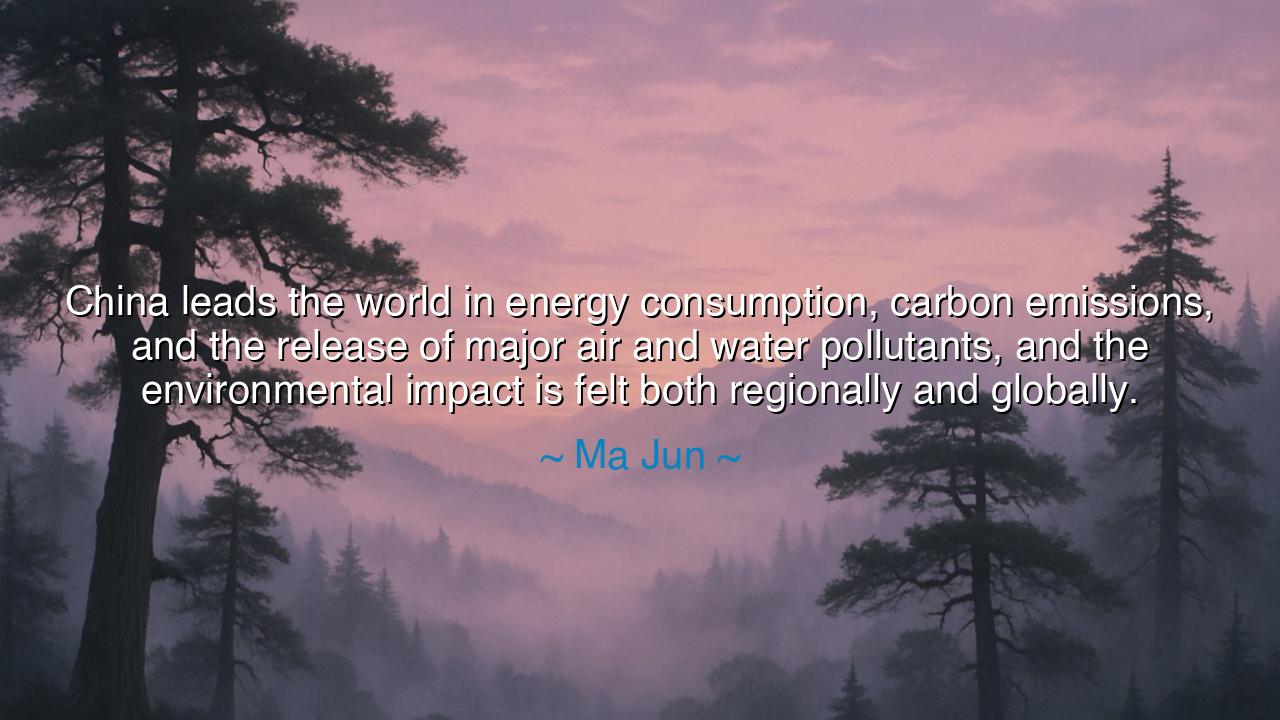
China leads the world in energy consumption, carbon emissions
China leads the world in energy consumption, carbon emissions, and the release of major air and water pollutants, and the environmental impact is felt both regionally and globally.






Hear the grave words of Ma Jun, a watchman of the earth’s balance, who declared: “China leads the world in energy consumption, carbon emissions, and the release of major air and water pollutants, and the environmental impact is felt both regionally and globally.” This saying is heavy with truth, for it reveals not merely the state of one nation, but the burden of the world. China, vast in people and industry, has become the forge of modern civilization, yet the smoke from that forge rises not only over her own skies, but drifts across borders, oceans, and generations.
He speaks first of energy consumption, the fire that fuels the engines of growth. China, in her rise from poverty to power, has burned more coal, oil, and gas than any nation before her. Cities once dark now blaze with lights, factories hum through the night, and millions are lifted from want into plenty. Yet this fire is not without cost. For the more the earth’s treasures are burned, the more the skies grow heavy, the more the seas grow warm, and the more the balance of nature trembles. Carbon emissions, born of this hunger for energy, have made China both a leader in progress and a giant in peril.
The second part of Ma Jun’s teaching warns of air and water pollutants. The rivers that once ran clear now carry the dyes of factories; the air that once swept across green plains now holds the smoke of endless chimneys. Children in Beijing wear masks not for ritual, but for survival. Farmers in distant villages watch their crops wither from poisoned streams. Here is the sorrow of growth without restraint: that the very gifts of nature, meant to sustain life, are turned into carriers of disease.
History, too, has witnessed this tragedy. In the age of the Industrial Revolution, London was a city cloaked in soot, her skies so darkened by coal that the sun was often hidden. In December of 1952, the Great Smog descended upon the city, lasting five days and claiming the lives of thousands. That disaster became a turning point, leading to the Clean Air Acts and the slow cleansing of the skies. Thus, we see that even great powers may poison themselves in their striving, but also that awakening and reform are possible when suffering forces wisdom upon the people.
Ma Jun reminds us that the impact is felt regionally and globally. Pollution respects no border. The winds that carry China’s smog drift over Korea and Japan. The rivers that receive her poisons pour into the seas that wash every shore. The carbon released into the air joins the atmosphere of all humankind, altering climates from the deserts of Africa to the forests of the Amazon. What happens in one land soon becomes the burden of all lands. This is the eternal lesson: that the earth is one body, and when one part is wounded, the whole suffers.
The deeper meaning of these words is both warning and call. China, though named, is not alone in this story. She is the mirror for all nations that rise upon the back of industry. The United States once bore the same mantle of pollution; Europe once darkened its skies in pursuit of wealth. Now it is China’s turn, and tomorrow it may be another’s. The truth is that the modern world is bound together, and the fate of one becomes the fate of all.
What lesson must future generations carry? It is this: greatness cannot be measured by production alone, but by stewardship. A nation that leads in power but destroys its environment is like a king who builds a palace while the ground beneath him crumbles. True leadership is not to consume the most, but to create paths that sustain both people and planet. Thus, each of us must live with awareness—choosing wisely what we consume, supporting clean energy, and raising voices for laws that protect air and water. For every choice is a seed, and together those seeds may grow into forests of renewal.
And so I say to you, listener of these words: let Ma Jun’s wisdom stir your spirit. Recognize that the smoke rising in one land may dim the skies of another. Live not as one who takes blindly, but as one who tends the earth with care. Support leaders who embrace clean technologies, reduce waste in your own life, and honor the bond between humanity and creation. For only then can the nations of the earth rise together—not as factories of destruction, but as guardians of life.






AAdministratorAdministrator
Welcome, honored guests. Please leave a comment, we will respond soon